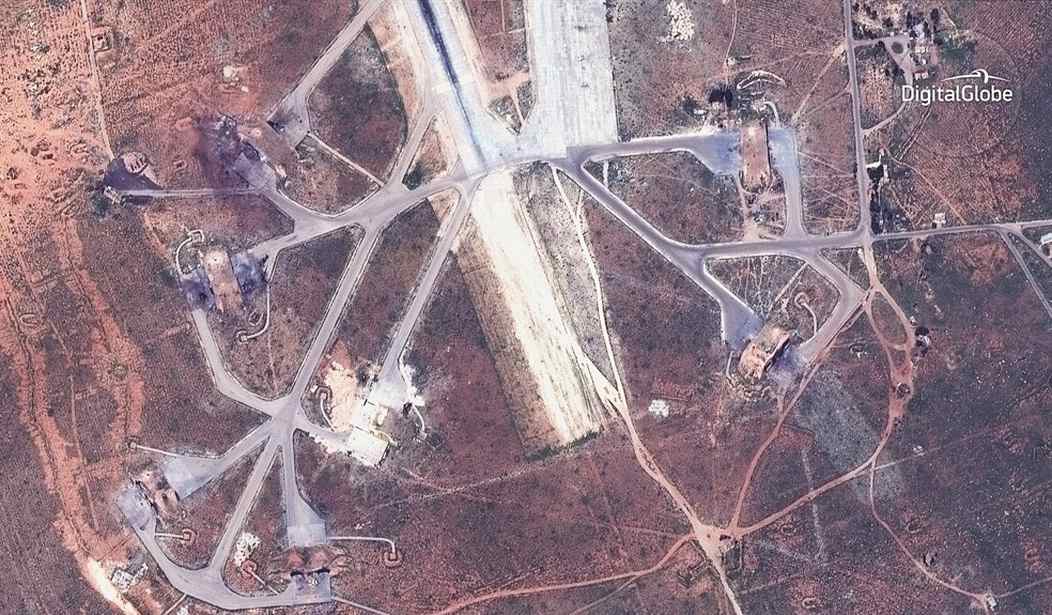Late last night, the White House issued a statement from Donald Trump warning Syria not to cross his red line on the use of chemical weapons. As Jazz noted, the media coverage of the statement tended to cast this as a “cryptic” warning, despite the fact that Bashar al-Assad has used chemical weapons on numerous occasions, and that Trump finally provided a military response to it in April. Last night, Buzzfeed couldn’t find anyone at the Pentagon who knew what had triggered the statement:
Five US defense officials reached by BuzzFeed News Monday said they did not know where the potential chemical attack would come from, including one US Central Command official who had “no idea” about its origin. The officials said they were unaware the White House was planning to release its statement; usually such statements are coordinated across the national security agencies and departments before they are released.
A Pentagon spokesperson declined to comment on the matter Monday and referred questions to the White House statement. A State Department spokesperson also referred BuzzFeed News to the White House statement and said the agency did not have anything to add.
By Tuesday morning, national security officials were getting briefs on what prompted the White House to release the statement warning Syria not to launch chemical weapons attacks on its civilians. Among some at the Pentagon, there was a feeling that although there was no intelligence indicating that a chemical weapons attack was imminent, there was evidence the regime was preparing to possibly use chemical weapons.
The briefings have apparently concluded, and the genesis of the threat turns out to be predictable enough. A Pentagon spokesman told the media that the same air base targeted in the US reprisal strike two months ago has begun preparing chemical weapons for deployment again:
The Pentagon says the U.S. has seen chemical weapons activity at a Syrian air base that was used for an April sarin gas attack.
Capt. Jeff Davis, a Pentagon spokesman, said Tuesday the activity at the Shayrat air base indicates “active preparations for chemical weapons use.”
Both Buzzfeed and the AP report that their sources had heard nothing about this activity prior to the warning being issued. That could be explained by either tighter op-sec, or an unrelated lack of access by their sources, or presumably a lack of solid intelligence on the part of the White House. The latter seems most unlikely, although perhaps one could question the wisdom of putting out a statement publicly on the matter and committing the US to a military response. At some point, Trump will need Congress to back up any escalation of military activity in Syria, especially if it gets to the point where we become entangled in a fight with Russian and Iranian units. Drawing the red line this publicly without first getting Congressional support is what forced Barack Obama into an embarrassing stand-down.
Both Russia and Iran are accusing the Trump administration of an unsupported escalation in the region:
The Kremlin also dismissed the White House statement, which had warned that Assad and his military would “pay a heavy price” if it goes ahead with the attack. Russian President Vladimir Putin’s spokesman Dmitry Peskov said that “such threats to Syria’s legitimate leaders are unacceptable.” …
Peskov criticized the Trump administration for using the phrase “another chemical weapons attack,” arguing that an independent investigation into the April attack was never conducted despite Russia’s calls for one. …
Iran’s foreign minister has denounced as a “dangerous escalation” the White House allegations that Syria is preparing a new chemical weapons attack.
Mohammad Javad Zarif wrote on his twitter account on Tuesday that the warning is based on a “fake pretext” and added that it “will only serve ISIS, precisely when it’s being wiped out by Iraqi & Syrian people.”
Given Assad’s numerous uses of chemical weapons — and the Russian guarantee to strip Assad of those weapons — the credibility of both Russia and Iran on this question is non-existent. However, their desire to keep Assad propped up is anything but non-existent, which has to be considered in light of the lack of desire by anyone in the US to get more involved in a Syrian quagmire on top of the Afghan quagmire and ISIS fight currently under way. Trump and his team had better hope that the attention on Shayrat will force Assad to stand down, but history shows that Assad usually just plays for time in these situations — and that may create a military confrontation with global implications in a very short period of time.








Join the conversation as a VIP Member